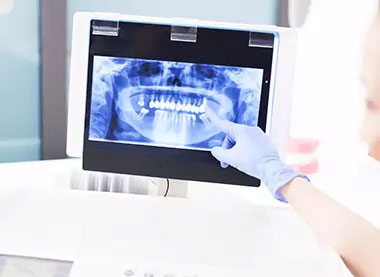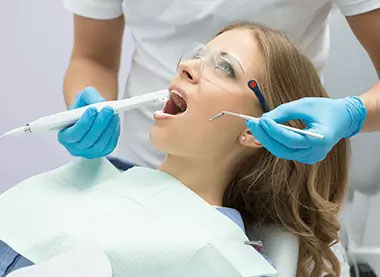Three Levels of Sedation Dentistry

Few people look forward to a trip to the dentist but for particularly anxious patients a dental appointment can strike fear into their hearts. The Dental Fears Research Clinic at the University of Washington in Seattle says up to 24 million people in the U.S. avoid the dentist because of extreme apprehension, while 64 million will only set foot inside a dental office when absolutely essential.
Neglecting professional dental care not only puts your oral health at risk but can also result in conditions such as diabetes, cancer and heart disease. People who are frightened at the prospect of dental treatment can benefit greatly from sedation dentistry, in which a drug is administered before or during the procedure to help them relax.
Sedation dentistry can be used for any treatment, from cleaning to invasive procedures such as extractions. Sedation dentistry is sometimes called sleep dentistry. However, in most cases patients remain awake. Sedative medication relaxes patients by slowing responses of the central nervous system. In most cases, you remain aware of your surroundings but are less reactive to external stimuli. Sedatives also reduce the sense of pain.
There are three levels of sedation dentistry:
- Minimal sedation.
- Moderate sedation.
- Deep sedation.
What is Minimal Sedation Dentistry?
Minimal dental sedation (anxiolysis) relaxes the patient, but they remain awake. It can be administered orally or by inhalation, or as a combination of both methods. Dentists who provide oral sedation will have their own preferences, but drugs commonly prescribed include the benzodiazepines Halcion (triazolam) and Valium (diazepam), taken about an hour before treatment. These drugs work on the central nervous system to lessen anxiety by toning down activity in receptors in the brain responsible for fear.
Although cognitive function may be mildly impaired temporarily with minimal sedation, the respiratory and heart systems continue to work as normal. With inhalation sedation, the patient breathes in a mix of oxygen and nitrous oxide (laughing gas) through a mask. Odorless and colorless, nitrous oxide (N2O) relaxes patients by stimulating pleasant feelings. It works fast and the effects tend to wear off quickly, too. After nitrous oxide sedation, the patient is given oxygen for a few minutes to avoid a headache and purge any remaining gas from the lungs. This also helps the patient to become alert again.
What is Moderate Sedation Dentistry?
With moderate sedation dentistry, an anti-anxiety drug is injected into the blood system via a vein in the hand or arm. It works quickly and the levels can be easily adjusted. The dosage depends on the treatment required and the length of the procedure. Pulse and oxygen levels are monitored throughout the treatment, and blood pressure is checked before and after.
Intravenous (IV) sedation can induce varying levels of consciousness, so the patient becomes less aware of the procedure. As with mild sedation, the patient remains conscious during IV sedation and can understand and respond to the dentist. The drugs used in moderate IV sedation cause the patient to partially or fully forget what happened during the procedure.
What is Deep Sedation Dentistry?
With deep sedation dentistry, the patient may go in and out of consciousness during treatment and typically have no recollection of the procedure afterward. Deep sedation, which is typically administered intravenously, induces depression of consciousness so the patient often needs help to maintain respiration. You may be given oxygen through a mask or through tubes placed inserted in the nostrils. Oxygen levels, heart rate, blood pressure and breathing are monitored throughout the procedure. The effects of deep sedation will gradually wear off during the course of the day, and most patients can return to normal activities within 24 hours.
Can Sedation Dentistry Help Me?
Sedation dentistry can help you tolerate many procedures, including dental implants and wisdom teeth extractions. If your levels of apprehension are particularly high, your dentist may also consider sedation for routine work such as X-rays and cleanings. Sedation can be particularly beneficial for patients with a strong gag reflex. Gagging entails both physiological and psychological reactions, and sedatives can address both issues for procedures such as impressions, fillings and X-rays.
Local anesthetic can make many dental procedures a painless experience, but some people fear needles (belonephobia). Sedatives can be used to ease the fear of needles while numbing the pain associated with injections. If you need extensive treatment, sedation allows your dentist to carry out several procedures during one appointment, resulting in fewer visits and reduced costs as well as relieving anxiety. Sedation dentistry can also help patients to cope with anxiety responses associated with the bright lights and strong antiseptic smells of a dental office.
Dental sedation may also be beneficial if you:
- Have had a bad experience with dental treatment previously.
- Have particularly sensitive oral nerves.
- Have a small mouth, which can become sore during dental treatment.
- Are resistant to local anesthetic.
- Have a general anxiety ailment.
- Have a phobia connected with dental procedures.
While sedation dentistry is an attractive option for anxious patients, it is crucial if your level of apprehension has reached the extent of dental phobia (odontophobia). The line between anxiety and phobia can be blurred, but, without professional help. odontophobia is likely to get worse over time. If you become panic-stricken at the thought of walking into a dental practice, your dentist may be able to refer you to a mental health specialist.
How to Find a Qualified Sedation Dentist
The American Dental Association (ADA) insists that dentists get special training to administer sedation. Additional training is required for IV certification by the Board of Dental Examiners. If you think that sedation dentistry, including IV sedation, can help you, look for a practice that’s licensed for sedation by the ADA and IV endorsed by the Board of Dental Examiners.
Feel free to contact our caring team at Gentle Dental Arts to inquire more about oral sedation. We make it our mission to create a comfortable, relaxed environment for our dental patients.










